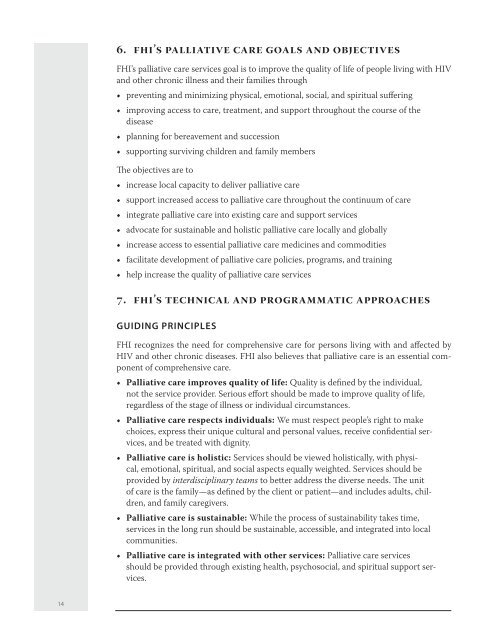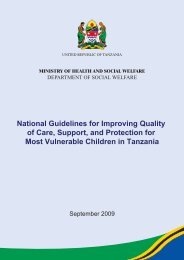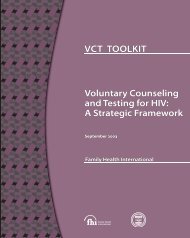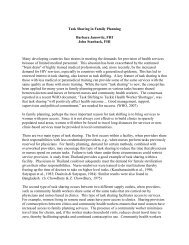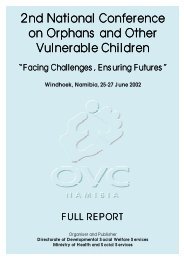Palliative Care Strategy for HIV and other diseases - FHI 360
Palliative Care Strategy for HIV and other diseases - FHI 360
Palliative Care Strategy for HIV and other diseases - FHI 360
Create successful ePaper yourself
Turn your PDF publications into a flip-book with our unique Google optimized e-Paper software.
14<br />
6. fhi’s palliative care goals <strong>and</strong> objectives<br />
<strong>FHI</strong>’s palliative care services goal is to improve the quality of life of people living with <strong>HIV</strong><br />
<strong>and</strong> <strong>other</strong> chronic illness <strong>and</strong> their families through<br />
• preventing <strong>and</strong> minimizing physical, emotional, social, <strong>and</strong> spiritual suffering<br />
• improving access to care, treatment, <strong>and</strong> support throughout the course of the<br />
disease<br />
• planning <strong>for</strong> bereavement <strong>and</strong> succession<br />
• supporting surviving children <strong>and</strong> family members<br />
The objectives are to<br />
• increase local capacity to deliver palliative care<br />
• support increased access to palliative care throughout the continuum of care<br />
• integrate palliative care into existing care <strong>and</strong> support services<br />
• advocate <strong>for</strong> sustainable <strong>and</strong> holistic palliative care locally <strong>and</strong> globally<br />
• increase access to essential palliative care medicines <strong>and</strong> commodities<br />
• facilitate development of palliative care policies, programs, <strong>and</strong> training<br />
• help increase the quality of palliative care services<br />
7. fhi’s technical <strong>and</strong> programmatic approaches<br />
guiding prinCiples<br />
<strong>FHI</strong> recognizes the need <strong>for</strong> comprehensive care <strong>for</strong> persons living with <strong>and</strong> affected by<br />
<strong>HIV</strong> <strong>and</strong> <strong>other</strong> chronic <strong>diseases</strong>. <strong>FHI</strong> also believes that palliative care is an essential component<br />
of comprehensive care.<br />
• <strong>Palliative</strong> care improves quality of life: Quality is defined by the individual,<br />
not the service provider. Serious ef<strong>for</strong>t should be made to improve quality of life,<br />
regardless of the stage of illness or individual circumstances.<br />
• <strong>Palliative</strong> care respects individuals: We must respect people’s right to make<br />
choices, express their unique cultural <strong>and</strong> personal values, receive confidential services,<br />
<strong>and</strong> be treated with dignity.<br />
• <strong>Palliative</strong> care is holistic: Services should be viewed holistically, with physical,<br />
emotional, spiritual, <strong>and</strong> social aspects equally weighted. Services should be<br />
provided by interdisciplinary teams to better address the diverse needs. The unit<br />
of care is the family—as defined by the client or patient—<strong>and</strong> includes adults, children,<br />
<strong>and</strong> family caregivers.<br />
• <strong>Palliative</strong> care is sustainable: While the process of sustainability takes time,<br />
services in the long run should be sustainable, accessible, <strong>and</strong> integrated into local<br />
communities.<br />
• <strong>Palliative</strong> care is integrated with <strong>other</strong> services: <strong>Palliative</strong> care services<br />
should be provided through existing health, psychosocial, <strong>and</strong> spiritual support services.


